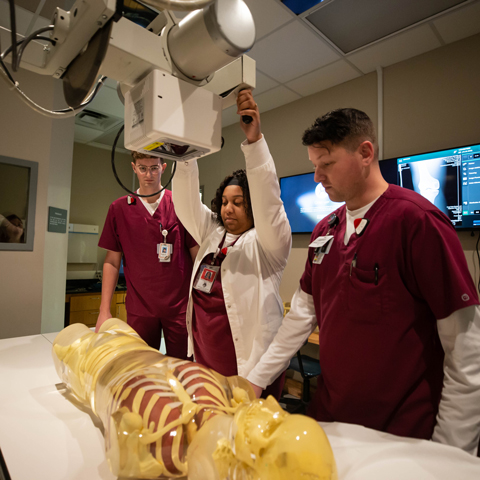Why Study Radiography
Students interested in a healthcare career who have a strong foundation in math and science.
The accredited radiography program provides the required didactic information for student success. The didactic classes are interspersed with clinical experiences. This provides students the opportunity to see the practical application of the information learned in the classroom. Successful completion of the program qualifies students for the required certification exam.
The curriculum includes a capstone exam prep class as well as faculty-student research collaboration.
There is a national shortage of radiographers. In 2019, the median salary for radiographers is $62,280.00 per year (hourly rate $29.94). Some hospitals in Middle Tennessee offered new graduates $10,000.00 sign on bonuses. There is also opportunity for career growth. Radiographers can obtain multiple certifications after becoming ARRT certified. These certifications include computed tomography (CT), magnetic resonance (MRI), mammography (M), and cardiac interventional (CI). Radiographers exhibit exceptional patient care while being an essential part of the medical diagnostic process. This career path allows students to help others. The combination of technology and science leads to a fulfilling career.
The radiography faculty members are registered radiographers. They have a variety of professional experience and hold a minimum of a masters’ degree.
Learn more about the Department
What Will I Learn
- Student(s) will demonstrate Clinical Competence
- Student(s) will develop professionalism
- Student(s) will demonstrate critical thinking skills
- The program will provide our healthcare community with quality radiologic technologists (radiographers)
Program Information
Radiography Program Requirements
Radiography Sample 4 Year Plan
Professional Licensure Disclosure
Students should be aware that licensure and certification requirements vary from state to state and are subject to change. Licensing agencies or boards also may have requirements in addition to an earned degree. APSU recommends that students who are not Tennessee residents or who plan to seek licensure or certification outside the state of Tennessee contact the appropriate licensing agency or board before they enroll in an academic program designed to lead to licensure or certification and discuss their plans with an advisor.
Please visit the Professional Licensure Disclosure webpage to review specific licensure information for your state and academic program.
